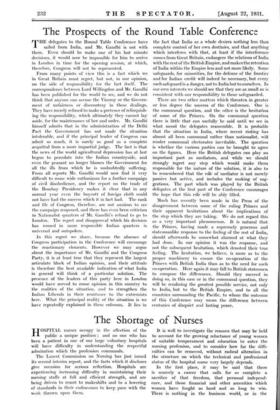The Prospects of the Round Table Conference
THE delegates to the Round Table Conference have sailed from India, and Mr. Gandhi is not with them. Even should he make one of his last minute decisions, it would now be impossible for him to arrive in London in time for the opening session, at which, therefore, Congress will not be represented.
From many points of view this is a fact which we in Great Britain must regret, but not, in our opinion, on the side of responsibility for the fact itself. The correspondence between Lord Willingdon and Mr. Gandhi has been published for the world to see, and we do not think that anyone can accuse the Viceroy or the Govern- ment of unfairness or discourtesy in these dealings. They have merely refused to make a pretence of relinquish- ing the responsibility, which ultimately they cannot lay aside, for the maintenance of law and order. Mr. Gandhi himself admits that in the administration of the Delhi Pact the Government has not made the situation intolerable, and if the principal leader of Congress can admit so much, it is surely as good as a complete acquittal from a more impartial judge. The fact is that the news of the world agricultural depression has at last begun to percolate into the Indian countryside, and even the peasant no longer blames the Government for all the ills from which he is undoubtedly suffering. From all reports Mr. Gandhi would now find it very difficult to rouse wide enthusiasm for a further campaign of civil disobedience, and the report on the trade of the Bombay Presidency makes it clear that in any normal year even the boycott of foreign cloth could not have had the success which it in fact had. The rank and file of Congress, therefore, are not anxious to see the campaign reopened, and there has even been criticism in Nationalist quarters of Mr. Gandhi's refusal to go to London. The regret and disapproval which his decision has roused in more responsible Indian quarters is universal and outspoken.
In this regret we share, because the absence of Congress participation in the Conference will encourage the reactionary elements. However we may argue about the importance of Mr. Gandhi and the Congress Party, it is at least true that they represent the largest articulate block of Indian opinion, and their attitude is therefore the best available indication of what India in general will think of a particular solution. The presence of the leaders of this party here in London would have served to rouse opinion in this country to the realities of the situation, and to strengthen the Indian Liberals in their resistance to the extremists here. What the principal reality of the situation is we have repeatedly explained in these columns. It lies in the fact that India as a whole desires nothing less than complete control of her own destinies, and that anything which interferes with that, at least if the interference comes from Great Britain, endangers the relations of India with the rest of the British Empire, and makes the retention of India within the Empire less and not more likely. Some safeguards, for minorities, for the defence of the frontier and for Indian credit will indeed be necessary, but every such safeguard is a danger, not to India but to ourselves. In our own interests we should see that they are as small as is consistent with our responsibility to those safeguarded.
There are two other matters which threaten in greater or less degree the success of the Conference. One is the communal question, and the other is the hesitation of some of the Princes. On the communal question there is little that can usefully be said until we see in what mood the delegates reassemble. It is probable that the situation in India, where recent rioting has almost all been communal rather than nationalist, will render communal electorates inevitable. The question is whether the various parties can be brought to agree on the figures. Here the British delegates can play an important part as mediators, and while we should strongly regret any step which would make them responsible for the nature of the solution, it is also to be remembered that the role of mediator is not merely passive but active, and includes the making of sug- gestions. The part which was played by the British delegates at the first part of the Conference encourages the hope that this role will be ably filled.
Much has recently been made in the Press of the disagreement between some of the ruling Princes and their apparent hesitations about the implications of the step which they are taking. We do not regard this as a very important phenomenon. It is natural that the Princes, having made a supremely generous and statesmanlike response to the feeling of the rest of India, should afterwards be somewhat alarmed at what they had done. In our opinion it was the response, and not the subsequent hesitation, which denoted their true feeling. The hesitation, we believe, is more as to the proper machinery to ensure the co-operation of the Princes with British India than as to the need for such co-operation. Here again it may fall to British statesmen to compose the differences. Should they succeed in doing so, in this case or in the communal question, they will be rendering the greatest possible service, not only to India, but to the British Empire, and to all the countries surrounding the Pacific, to whom the outcome of this Conference may mean the difference between centuries of disquiet and lasting peace.






























 Previous page
Previous page